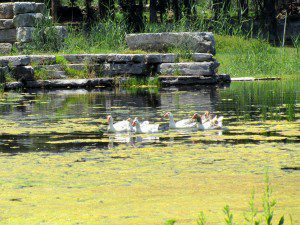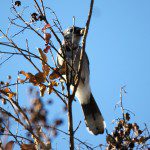 Over on Humanistic Paganism, John Halstead has a piece on magic titled ‘Goats’ Heads or Gaia?’: Instrumental Magic and Pagan Values. It draws on several well-respected sources in both Paganism and the social sciences to make the case that magic is “sloppy reasoning and wishful thinking.”
Over on Humanistic Paganism, John Halstead has a piece on magic titled ‘Goats’ Heads or Gaia?’: Instrumental Magic and Pagan Values. It draws on several well-respected sources in both Paganism and the social sciences to make the case that magic is “sloppy reasoning and wishful thinking.”
Let me start by saying I like John Halstead. He’s intelligent, articulate, and his analysis is insightful. One of his blog posts led to the Four Centers of Paganism, which is the best working model of the modern Pagan movement I’ve found. Despite his tendency to rub people the wrong way, he really is a nice person, and I’m happy to have him speaking for the non-theistic wing of our Big Tent of Paganism.
But I’ve got a few problems with this essay, problems that go beyond our differing assumptions about the nature of the Gods and the universe.
A definition of magic
I like to start with Aleister Crowley’s classic definition of magic: “the Science and Art of causing Change to occur in conformity with Will.” I see three different but interrelated types of magic: the manipulation of unseen forces, the intercession of Gods and spirits, and psychological programming. Within these three realms we find various expressions of magic such as folk magic, divination, ceremonial magic, chaos magic, bardic magic, and many others. This is a loose definition, but keep it in mind as you read on.
Instrumental magic
John Halstead draws on the work of anthropologist Tanya Luhrmann for his definition of instrumental magic. There are two fundamental premises:
1. That human will power is a real force, that alone, when concentrated, can effect supernatural changes in the material world.
2. That the universe is tied together by a system of hidden correspondences – analogous to, but distinct from, the natural laws recognized by scientists – and that by discovering the pattern of these correspondences magicians can effect supernatural changes in the material world.
That matches up well with one part of the three-fold definition: the manipulation of unseen forces.
Halstead simply dismisses this as escapism and wishful thinking. On one level I get it – if you’re a humanist, a naturalist, a non-theist, then the manipulation of unseen forces simply isn’t part of your worldview. It’s not possible, end of story. And he says:
The biggest problem with instrumental magic, as I see it, is that it tries to play on science’s turf. It pretends to be a science and a technology, and ends up just looking silly and impotent.
He’s got a valid point here. I see a lot of people (more New Agers than Pagans, but too many Pagans in any case) who claim science “proves” this or that supernatural theory, when it does nothing of the sort. Bad science makes bad religion, and bad science gets in the way of performing effective magic.
But to simply dismiss instrumental magic ignores one huge fact: sometimes it works. I don’t do a lot of spell work, but I’ve had enough success that if I have a need I won’t hesitate to light a candle or stir a cauldron. Magic clearly does not work as it’s portrayed in fiction, but it works often enough I’m convinced that chaos magicians have the right idea: successful magic moves the odds in your favor.
So far all we’ve got is a difference in foundational assumptions about the way the universe works and a difference in experiences of magic. But then John gets to the main point of his essay, and that’s where I we have more than a difference of opinion. He says:
According to [ecologist Trudy] Frisk, the instrumental view of magic “perpetuates the utilitarian view of nature. Expecting natural objects to fulfill human desires leads to disregard for maintaining nature in all its complexity.” This causes Frisk to wonder how Paganism really differs from monotheistic religions which encourage human dominion over nature.
Going from spell casting to dominion over Nature is a huge leap unsupported by either logic or observation. Go back to the definition of magic – it’s a way of getting things done. It’s a set of operational skills and techniques.
Magic is a tool, much like a hammer or a screwdriver or an iPad. Do we disregard the sovereignty of Nature when we use hammers and saws to build shelter from the elements? Do we attempt to claim dominion over Nature when we build fires (in a fireplace or in a gas furnace) to keep warm in winter? No – magic is no different than any other tool.
If anything, instrumental magic reminds magicians of their place in the grand scheme of things. Work a spell to stop a hurricane and you’ll see just how powerful you really are compared to Nature. Work a spell to make water flow uphill and you’ll quickly learn the difference between “moving the odds in your favor” and “violating the laws of Nature.”
Consciousness changing magic
John doesn’t dismiss magic entirely. He says:
Dion Fortune defined magic as the “art of changing consciousness at will”. By dropping the word “science” and adding the word “consciousness”, Fortune suggested the possibility of a different, non-instrumental view of magic. Non-instrumental magic can be understood as a psychological technique for changing ourselves in relation to the natural world.
This is very similar to the third type of magic – psychological programming. Lon Milo DuQuette says “It’s All In Your Head … You Just Have No Idea How Big Your Head Is.” I don’t agree that it’s all in your head, but certainly a good bit of it is. Change your thinking and you can change your life, even if you can’t violate the laws of Nature in the process.
But though he admits it’s real, John seems to be rejecting this magic as well.
from the perspective of the non-instrumental theory of magic, control is understood to be an illusion – whether we are speaking about the control of physical nature or control of the unconscious. Attempts to control either our “inner” nature or “outer” nature have a tendency to backfire. Depth psychology has taught us about the dangers of psychological “control” or repression. That which we believe we have controlled tends to find a way back into our lives.
So non-instrumental magic works but it’s too dangerous to use? There is truth in that, but some of us have decided it’s worth the risk. Witchcraft is dangerous. Dealing with the Gods is dangerous. Initiation is dangerous. In the words of Sharon Knight “there’s some wake mad, and some wake dead, and some will rise with a fire in their head.”
I won’t take others up that mountain unless I think they can handle it, and unless I’m sure they understand the risks. But anything worthwhile is dangerous. And desperate circumstances call for desperate measures. To dismiss psychological magic as too dangerous is to underestimate our resilience and our capacity for learning and growth.
Magic aligns us with Nature
John Halstead sees one positive use for magic – aligning us with Nature. He says:
we should try to learn about the pattern nature is weaving, and attune ourselves to it, before trying to alter the pattern. As I understand it, this attunement is precisely the purpose of earth-centered Pagan ritual: attunement with nature, attunement with our deeper selves, and attunement with one another.
Though I think perhaps he’s conflating magic and ritual a bit too much (there’s a lot of overlap, but they aren’t the same thing), I’m in strong agreement with the thought expressed. We absolutely should learn the pattern Nature is weaving and align ourselves with it. Magic works best when we swim with the currents of Nature and not against them. All those hours witches and other magic users spend learning correspondences and watching the sky and searching for hard-to-find plants teach us who and what Nature is and how she works, subtly if not directly.
Magic is not the best way to align ourselves with Nature. The best way is to make a conscious commitment to Nature: to study Nature, to form relationships with all her creatures, and most importantly, to revere Nature as our Great Mother. But magic – including instrumental magic – can help us draw closer to Nature.

Magic: a heritage and a calling
The practice of magic is part of our heritage. We see it in the stories of our ancestors. We see it in the folk practices that survived into modern times. We see it in the transformative work of initiatory orders. We even see it in our sporting events.
For John Halstead, becoming a Pagan was “a paradigm shift.” He says:
I no longer wanted to escape this world. Instead, I wanted to experience it more fully. I wanted to live more intensely, with all of my senses, to feel more alive, more vital.
I think most of us who have felt the call of Pagan ways – through any of the four centers – can relate to that desire. And we understand that for some, magic is simply too big of a paradigm shift to accept.
But for many of us, that intensity and that vitality are strengthened and energized through the diligent practice of magic.
















